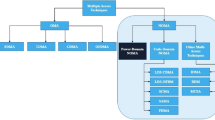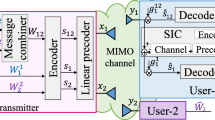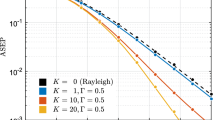Abstract
This paper proposes a distributed RS coding scheme to construct a subcode at the destination. Practically in any distributed coding scheme, an appropriate encoding strategy at the relay plays a vital role in achieving an optimized code. Therefore, the authors have proposed an efficient approach for proper selection of information at the relay based on subspace approach. Using this approach as the proper benchmark, another more practical selection approach with low complexity is also proposed. Monte Carlo simulations demonstrate that the distributed RS coding scheme under the two approaches can achieve nearly the same bit error rate performance. Furthermore, to jointly decode the source and relay codes at the destination, two different decoding algorithms named as naive and smart algorithms are proposed. The simulation results reveal that the advantage of smart algorithm as compared to naive one. The proposed distributed RS coding scheme with smart algorithm outperforms its non-cooperative scheme by a gain of 2.4–3.2 dB under identical conditions. Moreover, the proposed distributed RS coding scheme outperforms multiple existing distributed coding schemes, making it an excellent candidate for the future distributed coding wireless communications.















Similar content being viewed by others
References
Alamouti, S. (1998). A simple transmit diversity technique for wireless communications. IEEE Journal on Selected Areas in Communications, 16(8), 1451–1458.
Shankar P. M. (2017). Diversity techniques. In Fading and shadowing in wireless systems. Springer.
Le-Ngoc, T. (2016). 5G: From MIMO to massive MIMO. In 2016 3rd national foundation for science and technology development conference on information and computer science (NICS). Proceedings.
Laneman, J. N., Tse, D. N. C., & Wornell, G. W. (2004). Cooperative diversity in wireless networks: Efficient protocols and outage behavior. IEEE Transactions on Information Theory, 50(12), 3062–3080.
Hunter, T. E., & Nosratinia, A. (2006). Diversity through coded cooperation. IEEE Transactions on Wireless Communications, 5(2), 283–289.
Bao, X., Song, T. C., & Shen, L. F. (2012). Properties of virtual MIMO signal and interference in cooperation cognitive networks. Journal on Communications, 33(5), 85–90.
Han, L. (2018). Ergodic capacity upper bound for multi-hop full-duplex decode-and-forward relaying. Communications, Signal Processing, And Systems, 423, 157–164.
Dai, B., Yu, L. M. & Ma, Z. (2016). Compress-and-forward strategy for the relay broadcast channel with confidential messages. In 2016 IEEE international conference on communications workshops (ICC) (pp. 254–259).
Ou, Q. H., Hou, X. J., Liu, F., Liu, Y. A., & Fang, S. F. (2018). Joint partial relay and antenna selection for full-duplex amplify-and-forward relay networks. Wireless Internet (WICON 2016), 214, 149–154.
Fang, Y., Liew, S. C., & Wang, T. T. (2017). Design of distributed protograph LDPC codes for multi-relay coded-cooperation networks. IEEE Transactions on Wireless Communications, 16(11), 283–289.
Qiu, J., Chen, L., & Liu, S. Q. (2020). A novel concatenated coding scheme: RS-SC-LDPC codes. IEEE Communication Letter, 24(10), 2092–2095.
Asif, M., Zhou, W. Y., Yu, Q. P., Adnan, S., & Ali, M. S. (2020). Jointly designed quasi-cyclic LDPC-coded cooperation with diversity combining at receiver. International Journal Of Distributed Sensor Networks, 16(7), 1550147720938974.
Wang, H., & Chen, Q. C. (2019). LDPC based network coded cooperation design for multi-way relay networks. IEEE Access, 7, 62300–62311.
Zhao, C. L., Yang, F. F., Umar, R., & Mughal, S. (2020). Two-source asymmetric turbo-coded cooperative spatial modulation scheme with code matched interleaver. Electronics, 9(1), 537.
Mughal, S., Yang, F. F., Ejaz, S., Ahmed, S. H., & Umar, R. (2017). Asymmetric turbo code for coded-cooperative wireless communication based on matched interleaver with channel estimation and multi-receive antennas at the destination. Radio Engineering, 26(3), 878–889.
Ejaz, S., & Yang, F. F. (2018). Turbo codes with modified code matched interleaver for coded-cooperation in half-duplex wireless relay networks. Frequenz, 69(3–4), 171–184.
Umar, R., Yang, F. F., Xu, H. J., & Mughal, S. (2018). Multi-level construction of polar-coded single carrier-FDMA based on MIMO antennas for coded cooperative wireless communication. IET Communications, 12(10), 1253–1262.
Zhan, Q. C., Du, M. H., Wang, Y. G., & Zhou, F. S. (2014). Half-duplex relay systems based on polar codes. IET Communications, 8(4), 433–440.
Blasco-Serrano, R., Thobaben, R., Andersson, M., Rathi, V., & Skoglund, M. (2012). Polar codes for cooperative relaying. IEEE Transactions on Communications, 60(11), 3263–3273.
Ejaz, S., Yang, F. F., Xu, H. J., & Zhang, S. W. (2015). Jointly optimized multiple Reed–Muller codes for wireless half-duplex coded-cooperative network with joint decoding. Eurasip Journal on Wireless Communications and Networking, 2015, 1–15.
Ejaz, S., & Yang, F. F. (2017). Jointly optimized Reed–Muller codes for multilevel multirelay coded-cooperative VANETS. IEEE Transactions on Vehicular Technology, 66(5), 4017–4028.
Umar, R., Yang, F. F., & Mughal, S. (2019). Distributed Reed Muller code with multiple relays for cooperative broadband wireless networks. Radioelectronics and Communications Systems, 62(9), 449–461.
Bi, X. X., Ma, R. F., Qin, Z. L., & Liu, G. L. (2020). On relay selection for relay-assisted D2D communications with adaptive modulation and coding in cellular systems. In 6GN for future wireless networks. third EAI international conference (6GN 2020). Proceedings. Lecture Notes of the Institute for Computer Sciences, Social Informatics and Telecommunications Engineering (LNICST 337) (pp. 127–143).
Alhussien, N., & Gulliver, T. A. (2020). Optimal resource allocation in cellular networks with H2H/M2M coexistence. IEEE Transactions on Vehicular Technology, 69(11), 12951–12962.
Liang, H., Liu, A. J., Liu, X., & Cheng, F. Y. (2020). Construction and optimization for adaptive polar coded cooperation. IEEE Wireless Communications Letters, 9(8), 1187–1190.
Mughal, S., Yang, F. F., Xu, H. J., & Umar, R. (2019). Coded cooperative spatial modulation based on multi-level construction of polar code. Telecommunication Systems, 70(3), 435–446.
Park, J., & Kim, J. (2020). Generator polynomial model-based eye diagram estimation method for Bose–Chaudhuri–Hocquenghem (BCH) code and Reed–Solomon (RS) code. IEEE Transactions on Electromagnetic Compatibility, 62(1), 240–248.
Almawgani, A. H. M., & Salleh, M. F. M. (2010). Coded cooperation using Reed Solomon codes in slow fading channel. IEICE Electronics Express, 7(1), 27–32.
Almawgani, A. H. M., & Salleh, M. F. M. (2009). RS coded cooperation with adaptive cooperation level scheme over multipath Rayleigh fading channel. In 2009 IEEE 9th Malaysia international conference on communications (MICC) (pp. 480–484).
Al-Moliki, Y. M., Aldhaeebi, M. A., Almwald, G. A., & Shaobi, M. A. (2015). The performance of RS and RSCC coded cooperation systems using higher order modulation schemes. In Proceedings sixth international conference on intelligent systems, modelling and simulation (pp. 211–214).
Hurley, T. (2019). MDS codes over finite fields. arXiv (pp. 8).
Zhao, C., Yang, F. F., & Waweru, D. K. (2021). Reed–Solomon coded cooperative spatial modulation based on nested construction for wireless communication. Radioengineering, 30(1), 172–183.
van der Meulen, E. C. (1971). Three-terminal communication channels. Advances in Applied Probability, 3(1), 120–54.
Jalil, A. M., Meghdadi, V., & Cances ,J. P. (2014). Distributed coding based on partial relay selection. In 2014 IEEE wireless communications and networking conference (WCNC) (pp. 758–763).
Ma, J. F., & Wang, Y. M. (1996). Decoding of two new classes of linear block codes. Acta Electronica Sinica, 24(10), 95–99.
Chou, Z. D., Jiang, W. N., Xiang, C. B., & Li, M. (2013). Modulation recognition based on constellation diagram for M-QAM signals. In Proceedings Of 2013 IEEE 11th international conference on electronic measurement and instruments (ICEMI) (pp. 70–74).
Shu, L., Lin, S., & Costello, D. J. (2004). Error control coding (2nd ed.). New Delhi: Pearson Education.
Chen, F. W., Yang, L., Cusumano, V. T., & Chong, M. C. (2021). Early-onset colorectal cancer is associated with a lower risk of metachronous advanced neoplasia than traditional-onset colorectal cancer. Digestive Diseases and Sciences.
Chen, B., & Flanagan, M. F. (2015). Network-turbo-coding-based cooperation with distributed space-time block codes. Transactions On Emerging Telecommunications Technologies, 26(6), 992–1002.
Liu, Y., Pang, B., Zhang, Y., & Kang, C. (2016). Diversity of distributed linear convolutive space-time codes on fast fading Rayleigh channels. In 2016 international conference on computing, networking and communications (ICNC) (p. 5).
Acknowledgements
This work was supported by National Natural Science Foundation of China under the Contract No. 61771241.
Author information
Authors and Affiliations
Corresponding author
Additional information
Publisher's Note
Springer Nature remains neutral with regard to jurisdictional claims in published maps and institutional affiliations.
Rights and permissions
About this article
Cite this article
Guo, P., Yang, F., Zhao, C. et al. Jointly optimized design of distributed Reed–Solomon codes by proper selection in relay. Telecommun Syst 78, 391–403 (2021). https://doi.org/10.1007/s11235-021-00822-w
Accepted:
Published:
Issue Date:
DOI: https://doi.org/10.1007/s11235-021-00822-w




